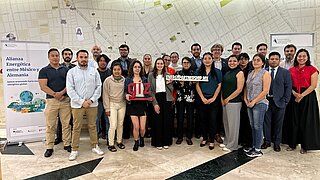Microgrids: Advancing a Just Energy Transition
Microgrids: Advancing a Just Energy Transition

The energy transition demands energy models that are just, resilient, and sustainable—models that can be strengthened through multi-stakeholder cooperation.
In this context, from May 19 to 23, the Microgrid Course was held, organized by the German-Mexican Energy Partnership and the German-Mexican Climate Change Alliance IV, both programs implemented by the Deutsche Gesellschaft für Internationale Zusammenarbeit (GIZ) GmbH (GIZ Mexico) on behalf of the German Federal Ministry for Economic Affairs and Energy (BMWE, by its German acronym).
This training space brought together professionals from the public sector, regulatory technicians, and civil society organizations committed to building a fairer, more resilient, and sustainable energy model.
In his welcome remarks, Dr. José María Valenzuela Robles, General Director of Technological Development and Energy Access, emphasized that microgrids are a key mechanism in the framework of energy justice actions led by Mexico’s Ministry of Energy (SENER by its acronym in Spanish).
During five days of hybrid sessions, participants strengthened their technical, financial, and regulatory capacities for the development of renewable energy-based microgrids. Through a theoretical and practical methodology, the course provided key tools for the planning, operation, and evaluation of these systems, with special focus on their potential to:
- Improve access to sustainable energy in marginalized communities.
- Promote energy resilience in the face of climate crises or central grid failures.
- Contribute to climate change mitigation through clean technologies.
- Integrate approaches focused on productive uses of energy and gender perspective.
According to the World Bank, through its "Energy Sector Management Assistance Program" (ESMAP), microgrids are small energy systems capable of supplying electricity to specific communities—often far from large urban centers—and can help reduce the energy access gap.
This course took place in a context where Mexico’s microgrid sector is in an early stage of development but is gaining increasing interest from public and social actors. This is evidenced by the inclusion of the energy justice concept in national energy policy and in recent actions by institutions such as SENER and the Federal Electricity Commission (CFE) aimed at addressing energy poverty. It also reflects the efforts of community-based and civil society organizations working to solve local energy challenges through renewable energy projects.
In this scenario, strengthening technical capacities is key to supporting the advancement of decentralized solutions such as microgrids, which could play a crucial role in reinforcing Mexico’s national electricity system.
In doing so, this initiative reaffirms the commitment to facilitating multisectoral learning spaces that support Mexico’s public climate and energy policies. The success of this course highlights the value of international cooperation and joint efforts toward a just and inclusive energy transition.